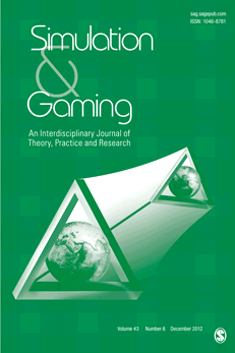
SIMULATION & GAMING
Scope & Guideline
Exploring the Future of Learning Through Play
Introduction
Aims and Scopes
- Educational Applications of Simulation and Gaming:
This area examines how simulations and games can be utilized as educational tools, enhancing engagement and learning outcomes in various contexts, including healthcare, environmental education, and social sciences. - Psychological and Social Dynamics:
Research in this scope investigates the psychological motivations and social interactions within gaming environments, exploring concepts such as community, identity, and player engagement. - Technological Innovations in Simulation:
Focuses on the integration of new technologies such as virtual reality (VR), augmented reality (AR), and artificial intelligence (AI) in enhancing the effectiveness and realism of simulations. - Serious Games for Professional Training:
This area looks into the design and effectiveness of serious games aimed at professional development, particularly in fields like healthcare, where simulations can improve practical skills and knowledge retention. - Research Methodologies in Simulation and Gaming:
The journal emphasizes robust research methodologies for evaluating the impact and effectiveness of simulation and gaming, including qualitative and quantitative approaches.
Trending and Emerging
- Health and Medical Training Simulations:
There is a significant increase in research dedicated to health and medical training simulations, particularly in using VR and serious games to enhance clinical skills and improve patient outcomes. - Gamification for Sustainable Development:
Emerging themes include the use of gamification strategies to promote sustainable practices and education, reflecting a growing societal focus on environmental issues and sustainability. - Interdisciplinary Approaches to Simulation:
An increasing trend is the interdisciplinary approach to simulation and gaming, where insights from fields such as psychology, education, and technology converge to create more effective training and educational tools. - Social Gaming and Community Engagement:
Research is increasingly focusing on social gaming aspects, exploring how games can foster community engagement, social skills, and collective problem-solving. - Use of Data Analytics in Gaming Research:
There is a rising interest in utilizing data analytics to understand player behaviors and experiences, enhancing the design and effectiveness of games and simulations.
Declining or Waning
- Traditional Board Games and Physical Gaming:
There has been a noticeable decrease in research focusing on traditional board games and physical gaming experiences, as the field shifts towards digital and immersive gaming technologies. - Single-Player Gaming Experiences:
Research on single-player games is becoming less frequent, with a growing emphasis on multiplayer and social gaming experiences that foster community interaction and collaboration. - Basic Gamification Techniques:
The exploration of basic gamification techniques is waning as researchers seek more complex and integrative approaches to gamification that align with educational and training goals. - Descriptive Studies of Gaming:
There is a decline in purely descriptive studies of gaming without a strong theoretical framework or practical application, as the field moves towards more impactful and applied research. - Focus on Casual Gaming:
The focus on casual gaming, particularly in educational contexts, appears to be diminishing as interest shifts towards serious games and simulations that offer deeper learning experiences.
Similar Journals
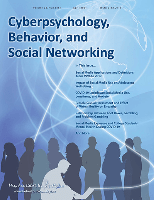
Cyberpsychology Behavior and Social Networking
Advancing Insights into Online InteractionsCyberpsychology Behavior and Social Networking is a leading international journal dedicated to the exploration of the intricate relationship between psychology and digital interactions. Published by Mary Ann Liebert, Inc, this esteemed journal boasts a strong impact factor, reflecting its significance in the fields of psychology, communication, and computer science. With a broad scope encompassing topics such as social networking, online behavior, and human-computer interaction, the journal aims to provide a vital platform for researchers, professionals, and students to share innovative research and insights. Recognized as a Q1 journal across multiple categories, including Applied Psychology and Human-Computer Interaction, it ranks impressively among its peers, underscoring its influence in advancing academic discourse. Additionally, the journal offers open access options, enhancing the visibility and accessibility of published work to a diverse audience. As digital technologies continue to evolve, Cyberpsychology Behavior and Social Networking remains at the forefront, fostering scholarly dialogue that navigates the psychological ramifications of our increasingly interconnected digital lives.

Contemporary Educational Technology
Pioneering Solutions for Modern Learning EnvironmentsContemporary Educational Technology is a premier journal published by BASTAS PUBL LTD - UK, specializing in the dynamic intersection of educational practices and technological advancements. With an E-ISSN of 1309-517X, this journal serves as a vital resource for researchers, educators, and professionals keen to explore innovative solutions and methodologies in education. Ranked in the Q2 category for both Education and Management of Technology and Innovation in 2023, Contemporary Educational Technology boasts impressive Scopus ranks, standing at #187 out of 1543 in the Social Sciences Education field, reflecting its influence and contribution to contemporary research. Through its open-access approach, this journal facilitates the dissemination of knowledge, making cutting-edge research readily available to a global audience. By examining developments from 2018 through 2024, it aims to critically analyze and promote the integration of technology in educational contexts, thereby fostering improved learning outcomes and innovative teaching practices.
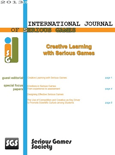
International Journal of Serious Games
Championing Open Access to Game-Changing ResearchThe International Journal of Serious Games is a pioneering publication dedicated to advancing the interdisciplinary field of serious games and their application in various domains such as education, artificial intelligence, and human-computer interaction. Published by SERIOUS GAMES SOC in Italy, this Open Access journal has been facilitating unrestricted access to innovative research since 2014. The journal is recognized for its quality, achieving prominent rankings in its categories, including Q2 in Education and Q2 in Computer Graphics and Computer-Aided Design as of 2023. With its commitment to academic rigor, it places itself as an essential resource for researchers, professionals, and students seeking to explore the transformative potential of serious games. Housed at the IST INT COMUNICAZIONI, VILLA PIAGGIO, GENOA, the journal continues to foster knowledge sharing and collaboration across disciplines, enriching the global discourse on gaming for impact.
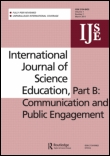
International Journal of Science Education Part B-Communication and Public Engagement
Cultivating a community of science communicators and educators.The International Journal of Science Education Part B: Communication and Public Engagement, published by Routledge Journals, Taylor & Francis Ltd, is a leading peer-reviewed journal dedicated to advancing research in the evolving fields of science communication and public engagement in education. With an ISSN of 2154-8455 and E-ISSN of 2154-8463, the journal has established itself as a key resource for researchers, educators, and practitioners interested in innovative communication strategies and engagement practices that enhance public understanding of science. It holds a commendable Q2 ranking in both the Communication and Education categories for 2023, reflecting its significant impact within academia—ranked 139th in Social Sciences Communication and 515th in Social Sciences Education based on Scopus metrics. Over its publication years from 2011 to 2024, the journal has provided a platform for scholars to share their insights and empirical findings, fostering dialogue and collaboration among professionals. Although it does not offer open access, it remains a vital source of knowledge, keeping stakeholders informed about the latest developments in science education and public outreach.
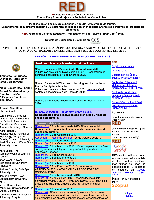
RED-Revista de Educacion a Distancia
Transforming Education with Technology-Driven ResearchRED-Revista de Educacion a Distancia is a premier open-access journal published by UNIV MURCIA in Spain, dedicated to advancing research in the fields of education and computer science applications. Since its inception in 2001, the journal has served as an essential platform for disseminating innovative research and practical applications of distance education methodologies. With an impressive impact factor and ranked in Q2 across both Computer Science Applications and Education categories as of 2023, RED is recognized for its significant contribution to the scholarly community, particularly within the Social Sciences and Engineering domains. Researchers and professionals are invited to explore cutting-edge studies that underpin pedagogical effectiveness and technological integration in educational settings. Based at the Edificio Pleiades Campus de Espinardo in Murcia, RED continues to foster an engaging dialogue among academics, providing insights that propel the field forward.

TEM Journal-Technology Education Management Informatics
Connecting Scholars to Transform Educational LandscapesTEM Journal - Technology Education Management Informatics (ISSN: 2217-8309, E-ISSN: 2217-8333) is an esteemed academic journal published by UIKTEN - Association for Information Communication Technology Education & Science based in Serbia. Since its inception in 2012, this Open Access journal has been at the forefront of disseminating cutting-edge research and innovative practices within the fields of technology education, management, and informatics. With a commitment to advancing knowledge, TEM Journal provides a platform for scholars, educators, and practitioners to share insights that foster synergy between technology and education. Ranked in the Q3 and Q4 categories across various disciplines, including Computer Science and Management of Technology and Innovation, the journal strives to enhance its impact through rigorous peer-review and a broad international readership. Researchers aiming to contribute their findings will find a supportive environment dedicated to enhancing educational practices and technological advancement.

Frontiers in Virtual Reality
Unlocking New Realities Through Scholarly InsightFrontiers in Virtual Reality, published by FRONTIERS MEDIA SA, is a leading open-access journal that has been at the forefront of the burgeoning field of virtual reality since its establishment in 2020. Based in Lausanne, Switzerland, this journal provides a vital platform for researchers, professionals, and students eager to explore and disseminate innovative findings related to virtual environments, immersive technologies, and human-computer interaction. With a commendable 2023 ranking placing it in the Q2 quartiles across prestigious categories such as Computer Graphics, Computer-Aided Design, and Human-Computer Interaction, the journal is highly regarded for its rigorous peer-review process and commitment to promoting scholarly communication. Frontiers in Virtual Reality not only advances the understanding of immersive experiences but also encourages interdisciplinary research that bridges the gaps between technology and human interaction. As an essential source of knowledge and a discussion forum for cutting-edge advances, this journal continues to shape the future of virtual reality research with easily accessible content and a responsive editorial approach.

Bulletin of the Technical Committee on Learning Technology
Bridging Knowledge and Innovation in Learning TechnologiesBulletin of the Technical Committee on Learning Technology, published by IEEE-INST ELECTRICAL ELECTRONICS ENGINEERS INC, is a pivotal journal that intersects the realms of education and computer science. With a noteworthy ISSN of 2306-0212, this journal serves as a vital platform for disseminating innovative research and development in learning technologies, particularly focusing on technological advancements that enhance educational environments and methodologies. Although coverage in Scopus has been discontinued, the journal's past contributions are reflected in its competitive rankings, with a position of Rank #624 in Social Sciences - Education and Rank #427 in Computer Science - Computer Science Applications. This indicates a solid niche in the academic landscape, making it a valuable resource for researchers, educators, and practitioners seeking to advance the dialogue around technology integration in learning. The Bulletin fosters an open exchange of knowledge and encourages the exploration of emerging technology applications in education, positioning itself as an important component in the ongoing development of learning technologies.

BEHAVIOUR & INFORMATION TECHNOLOGY
Exploring the Intersection of Mind and Machine.BEHAVIOUR & INFORMATION TECHNOLOGY, published by Taylor & Francis Ltd, is a leading journal in the interdisciplinary field that bridges the gap between technology and human behavior. Established in 1982 and continuing through 2024, this journal has garnered a high reputation with impressive rankings in 2023 across various categories: Q1 in Arts and Humanities (miscellaneous), Q2 in Developmental and Educational Psychology, Q2 in Human-Computer Interaction, and Q1 in Social Sciences (miscellaneous). The journal's robust Scopus rankings point to its influence among peers, being placed in the top percentiles across multiple relevant disciplines. Although it does not offer open access, it remains a pivotal resource for researchers and practitioners interested in the dynamics of technology's impact on behavior. By publishing rigorously peer-reviewed research, BEHAVIOUR & INFORMATION TECHNOLOGY aims to foster insights that enhance our understanding of how information technology shapes human interactions and societal outcomes, making it a crucial publication for anyone engaged in this rapidly evolving field.
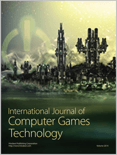
International Journal of Computer Games Technology
Pioneering Research in Gaming TechnologyInternational Journal of Computer Games Technology, an esteemed publication from HINDAWI LTD, serves as a pivotal platform for scholars and practitioners in the realms of computer graphics, software, and human-computer interaction. Since its inception in 2008 as an open-access journal, it has committed to disseminating cutting-edge research and innovative practices within the gaming technology sector. The journal, identified by its ISSN 1687-7047 and E-ISSN 1687-7055, is based in the United States and boasts a converged publication timeline from 2009 to 2024. Recognized in the 2023 Category Quartiles for its contributions to notable fields, it ranks Q3 in Computer Graphics and Computer-Aided Design, Q4 in Human-Computer Interaction, and Q3 in Software. With its active presence in Scopus rankings, the journal holds commendable positions in multiple categories, indicating a growing impact on the academic community. This journal not only aims to advance knowledge but also encourages collaborative exploration and innovative solutions, making it an essential resource for researchers, professionals, and students dedicated to the evolution of gaming technology.